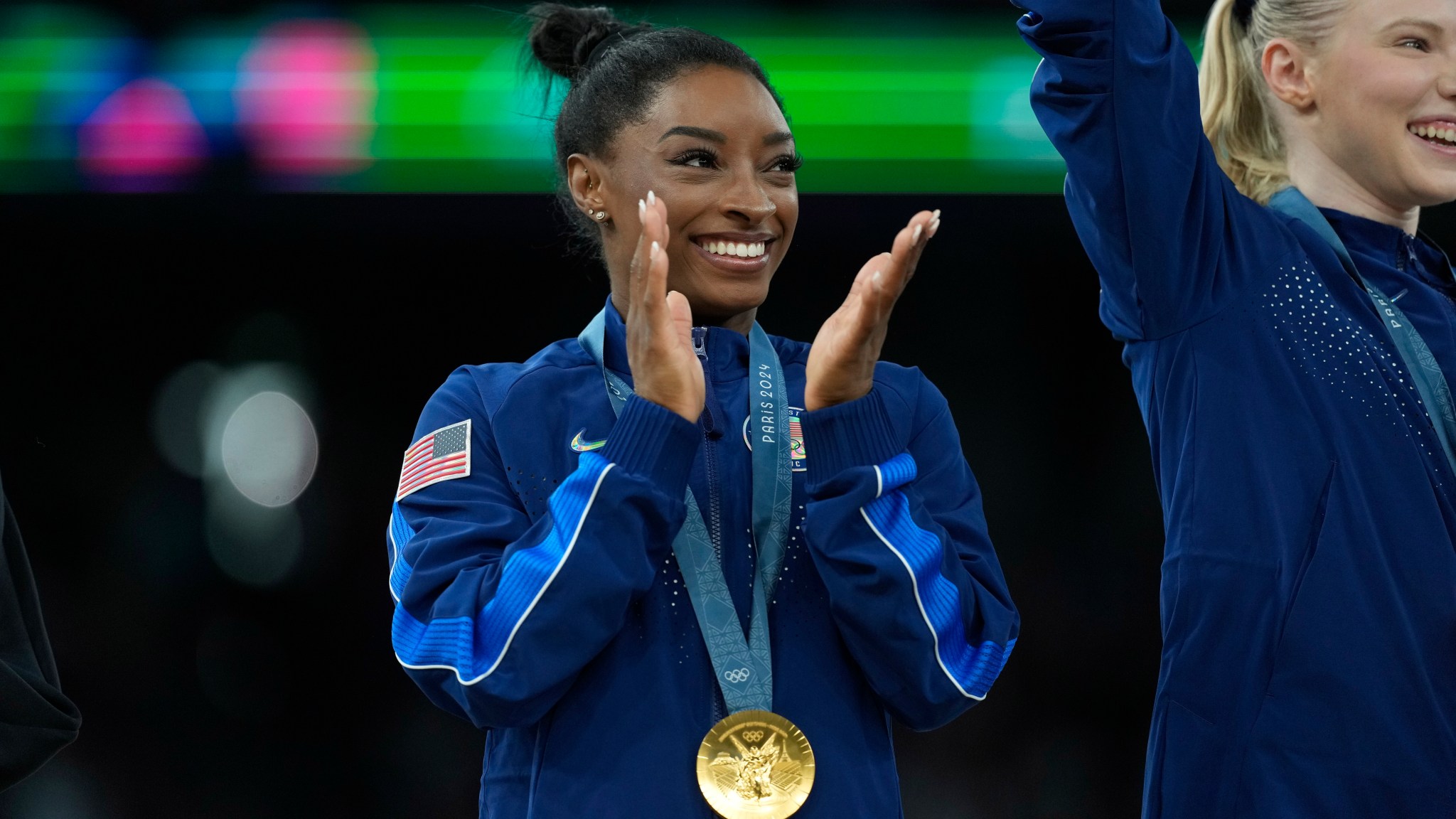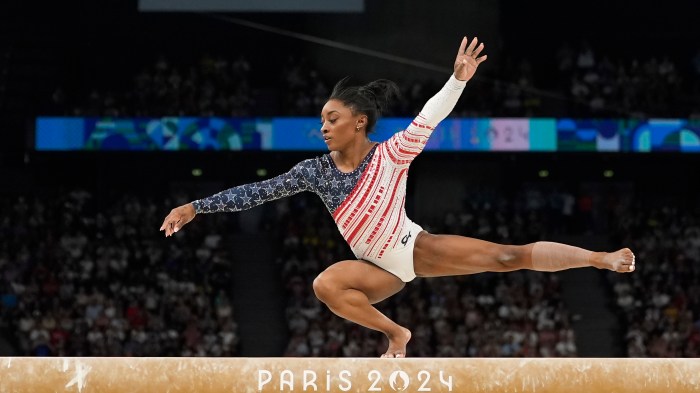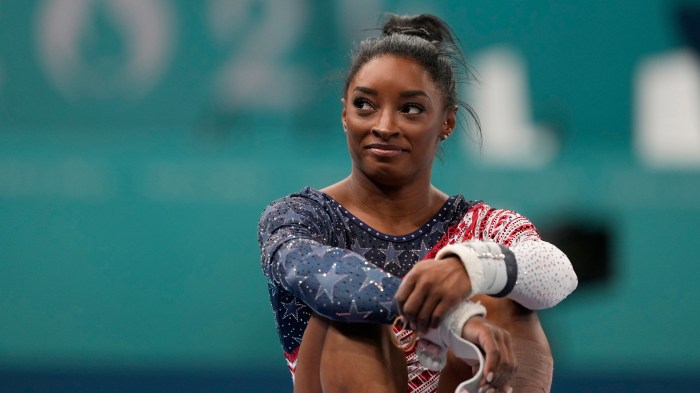Up Next

Simone Biles and a legacy that goes beyond a medal count
Greatest gymnast of all time is the culmination of decades of hopes and dreams crushed and deferred

Andscape at the Olympics is an ongoing series exploring the Black athletes and culture around the 2024 Paris Games.
PARIS — It’s only fitting that the great gymnast Simone Biles would make a powerful Olympic comeback in Paris. This is the city where African American artists have found favor since the beginning of the 20th century, a city where Black American women have become stars.
Paris is where the great entertainer Josephine Baker became a legend and where Althea Gibson won the French Championships, now the French Open, becoming the first African American to win a Grand Slam tennis event. The 27-year-old Biles has used the Paris Games to cement her claim as the greatest gymnast of all time.
Three years after withdrawing from the delayed 2020 Tokyo Games in 2021 and beginning a long overdue conversation about mental health, Biles returned to Olympic competition with tornadic force. On Sunday, she finished first in the all-around in team qualifying despite competing with an injured left calf.
On Tuesday, Biles led a powerhouse U.S. team to its third gold medal in four Olympics. On Thursday, Biles will go for the all-important all-around gold medal and over the weekend she can win multiple medals on individual apparatus.
Biles and Team USA have called the Paris Olympics a redemption tour. Team USA won the silver medal in 2021 at the delayed 2020 Tokyo Games, but that was considered a failure. On July 27, 2021, Biles stunned the gymnastics world when she withdrew from the women’s gymnastics team competition finals. A day later, Biles withdrew from the individual all-around competition. Team USA was a heavy favorite in Tokyo and failed to win gold largely because Biles withdrew from the final because of a mental block called the twisties that did not allow her to perform.
That silver medal in Tokyo ended the United States’ consecutive team winning streak at two and Biles would miss 732 days away from the sport.
Far be it from me to quibble with Biles about redemption, but that seems to have put additional pressure on Biles and the team to win gold when all she did in 2021 was chose to take care of herself.
Biles is too great to chase redemption.

Abbie Parr/AP Photo
The 2024 Olympics are less about redemption than validating what we all know: Biles is the greatest gymnast of all time. She has five gymnastic skills named after her and is the most decorated gymnast of hers or any other generation. Biles won her fifth Olympic gold medal Tuesday. She is a six-time world all-around champion and has more World Championship medals (30) and World Championship gold medals (23) than any other gymnast in history.
When asked about the medal count, Biles said she’s not counting.
“Honestly I would have had to Google that,” she said Tuesday when asked about her medals. “I don’t keep count. I don’t keep stats. I just go out here and do what I’m supposed to and I’m doing what I love and enjoying it, so that’s really all that matters to me.”
Perhaps it’s because Biles realizes that she is also the culmination of so many decades of hopes and dreams crushed and deferred simply because the sport was not willing to accept diversity and inclusion.
Last week, I looked at the Wendy Hilliard Gymnastics Foundation website, which compiled a section dedicated to the shoulders on which Biles has stood. In 1979, Hilliard became the first Black athlete to represent the U.S. internationally in rhythmic gymnastics. Her site is dedicated to detailing the history of African Americans in gymnastics.
I looked at the timeline and listened to familiar stories of isolation and frustration. Like swimming, gymnastics for aspiring African American athletes has been a lonely space.
- In 1972, Alexandra Nicholson became the first Black woman to win an individual medal at the World Championships. She won gold on the trampoline.
- In 1980, Luci Collins became the first Black woman to be named to the U.S. Olympic gymnastics team. Her dream died when the United States boycotted the Moscow Games.
- In 1983, Dianne Durham became the first Black female U.S. all-around champion and the first to win an individual national event title. She just missed making the U.S. Olympic team.
- In 1991, Betty Okino became the first Black gymnast to win the American Cup and in 1992, Dominique Dawes became the first Black female gymnast to win an individual Olympic medal and the first to make multiple U.S. Olympic teams.
- In 2012, Gabby Douglas became the first Black gymnast to win an Olympic all-around gymnastics title. She was also the first American to win all-around and team golds at the same Games.
Biles made her first Olympic team in 2016 and has never looked back.

Charlie Riedel/AP Photo
But Biles has become a pioneer in her own right. She continues to compete and excel, well beyond the age when most gymnasts have left the sport. Biles is the oldest American woman to win an Olympic gold in gymnastics in 60 years. Perhaps she is showing future generations of gymnasts that their careers can have a longer runway.
And like Baker, Biles is a force of nature. The comparisons between Baker and Biles are intriguing but not always precise. Baker became a star when she came to Paris while Biles was already a star when she arrived. On the other hand, both women were impetuous and successful at an early age. Baker was 19 years old when she arrived in Paris in 1925 and became a hit virtually from her first bold performance. Biles was 19 years old when she won her first Olympic gold medal and became a dominant, revolutionary force.
And just as Baker did more than sing during her life in Paris, Biles did more than flip. During World War II, Baker was a member of the French Resistance and a rights activist. Biles brought international attention to mental health when she made the bold move to withdraw from Olympic competition in 2021. Since then, Biles has helped change the way athletes approach training with an emphasis on self-care.
Just as significantly, Biles has created a community of elite Black women in her Houston gym. In her documentary, Simone Biles Rising, what comes across is a part of Biles many may not know — a side that is committed to nurturing and supporting fellow gymnasts, not as a superstar but as a friend and as a sister.
In the interview room after Tuesday’s match, Biles talked about how the powers that be in gymnastics once wanted to put young gymnasts in a box that took the joy out of the sport. She has used the last three years to put the joy back in the sport. There’s a lightness now that was missing for a number of years. There is a work/life balance between competing hard and self-care.
“We can show off our personalities, really have fun,’’ she said, “but then also know that once we get on the floor we’re going to put in work and we’re going to show the results and we don’t have to be put in the box anymore.”
In 2021, Baker became the first Black woman to enter France’s Panthéon mausoleum of outstanding historical figures. Biles already has a foot in the pantheon of legendary athletes.
She still has more work to do this week. She’s not finished just yet. But just as Baker’s legacy went beyond the stage, Biles’ legacy goes beyond a medal count. Her stature has grown, and she has found her voice, she has found her power.
Josephine Baker would be proud.
